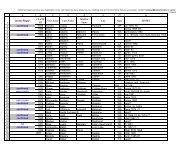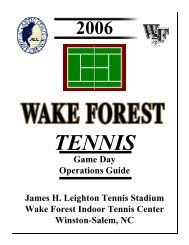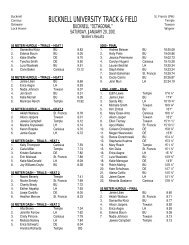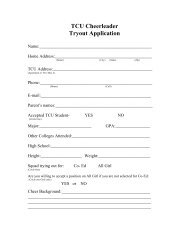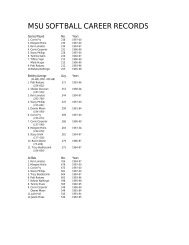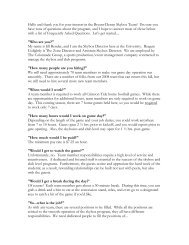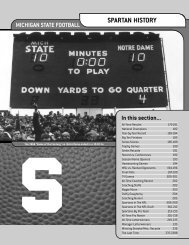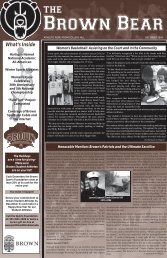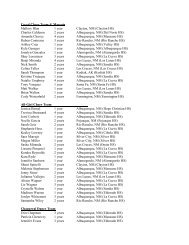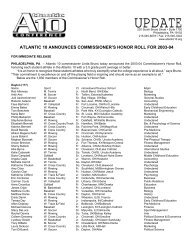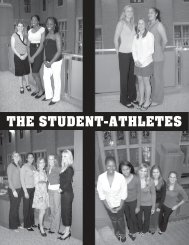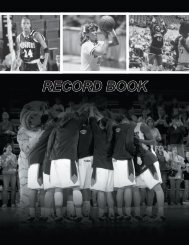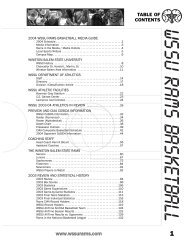SPARTAN COACHING STAFF - Netitor
SPARTAN COACHING STAFF - Netitor
SPARTAN COACHING STAFF - Netitor
Create successful ePaper yourself
Turn your PDF publications into a flip-book with our unique Google optimized e-Paper software.
2001 <strong>SPARTAN</strong> FOOTBALL<br />
MICHIGAN STATE FOOTBALL<br />
<strong>SPARTAN</strong> <strong>COACHING</strong> <strong>STAFF</strong><br />
MSU was the only team in the country to record two wins over BCS teams during the 2000 regular season.<br />
In this section...<br />
Bobby Williams 78-79<br />
Q&A With Bobby Williams 80<br />
Reggie Mitchell 81<br />
Morris Watts 82<br />
Bill Miller 83<br />
Brad Lawing 84<br />
Don Treadwell 85<br />
Jeff Stoutland 86<br />
Pat Perles 87<br />
Sal Sunseri 88<br />
Troy Douglas 89<br />
Ken Mannie 90<br />
Mike Vollmar 91<br />
Graduate Assistants 92<br />
Support Staff 92<br />
2001 MEDIA GUIDE msuspartans.com
MICHIGAN STATE UNIVERSITY<br />
Head Coach<br />
<strong>COACHING</strong> <strong>STAFF</strong><br />
Bobby WIlliams, Head Coach, Second Season<br />
<strong>COACHING</strong> <strong>STAFF</strong><br />
The 2000 season marked the<br />
beginning of a new era in Michigan<br />
State football history as Bobby<br />
Williams took over the Spartan program.<br />
Amidst a groundswell of support<br />
from his colleagues, alumni,<br />
fans, players and the entire university<br />
community, the 42-year-old St.<br />
Louis native became the 21st head<br />
football coach at Michigan State on<br />
Dec. 5, 1999.<br />
In his first full season as head<br />
coach, Williams compiled a 5-6<br />
record against one of the nation’s most demanding schedules (ranked No.<br />
20 by the NCAA). Michigan State’s 11 regular-season opponents had a<br />
combined winning percentage of .583 (67-48), including seven bowl<br />
teams – Marshall (Motor City), Notre Dame (Fiesta), Northwestern<br />
(Alamo), Wisconsin (Sun), Michigan (Citrus), Ohio State (Outback)<br />
and Purdue (Rose).<br />
The Spartans were only a few plays away from a 7-4 record, losing<br />
two games – both in the fourth quarter – by a combined total of 12<br />
points.<br />
Michigan State opened the 2000 season with three-straight wins,<br />
including a 27-21 come-from-behind triumph over No. 16 Notre Dame,<br />
and climbed to No. 15 in the USA Today/ESPN Poll. The Spartans were<br />
decimated by injuries during the heart of the Big Ten schedule, with 10<br />
starters sidelined for a combined total of 29 games. Michigan State closed<br />
out its home schedule with a bang by knocking off No. 9 Purdue, 30-10<br />
– its second win over a BCS (Bowl Championship Series) team. No other<br />
team in the country accomplished that feat during the 2000 regular season.<br />
“2000 was a season of missed opportunities,” Williams said. “We<br />
were only a handful of plays away from having an outstanding record. We<br />
had so many injuries that it was frustrating at times. We were forced to<br />
play a lot of young guys last year but I was proud of the way the team<br />
competed. We had a chance to win every game we played.”<br />
In 2000, Williams put together a recruiting class that experts considered<br />
to be Michigan State’s best in 20 years, with PrepStar ranking it No.<br />
2 in the nation and Tom Lemming’s Prep Football Report No. 6. He followed<br />
that up with another top 20 recruiting class in 2001, according to<br />
Max Emfinger’s Blue Chip Recruiting (No. 19).<br />
Williams, the Spartans’ running backs coach for 10 years and associate<br />
head coach for one year, made his head coaching debut on Jan. 1,<br />
2000, as he led Michigan State to a 37-34 victory over No. 10 Florida in<br />
the Florida Citrus Bowl. The Spartans finished the 1999 season with a<br />
10-2 overall record and ranked No. 7 in the final polls.<br />
“This is truly the opportunity of a lifetime,” Williams said at the<br />
press conference announcing his appointment. “I have received tremendous<br />
support from the administration, faculty, players, coaches, student<br />
body and the entire community. This move adds some stability to the<br />
program and I feel this football program is ready to take the next step,<br />
which is competing for championships.”<br />
“Bobby Williams knows football, he knows today’s student-athlete,<br />
and he knows Michigan State and the Big Ten,” Michigan State athletics<br />
director Clarence Underwood said. “This program has made great<br />
strides, and Bobby has been at the heart of our success.”<br />
Williams was elevated to the position of associate head coach prior to<br />
the 1999 campaign while retaining his duties with the running backs.<br />
He first joined the Spartan staff May 31, 1990, as running backs<br />
coach. That fall the Spartans were Big Ten co-champions and defeated<br />
Southern Cal in the John Hancock Bowl, the first of six bowl games<br />
Michigan State would reach in Williams’ 11 years with the program.<br />
During his stint with Michigan State’s running backs, Williams<br />
coached seven 1,000-yard rushers including Sedrick Irvin, who in 1998<br />
became the first Spartan in school history to reach the rushing milestone<br />
in each of his first three seasons. He also tutored Tico Duckett, who<br />
recorded three-straight 1,000-yard seasons from 1990-92, and Marc<br />
Renaud, who hit four digits in ’95.<br />
Prior to his arrival in East Lansing, Mich., Williams spent four<br />
months as receivers coach under Glen Mason at Kansas (1990).<br />
He previously served as offensive backfield coach for five years at<br />
Eastern Michigan (1985-89). Williams handled the additional duties of<br />
administrative assistant in 1989. During his stint at Eastern Michigan,<br />
the Eagles won the ’87 Mid-American Conference title and defeated San<br />
Jose State, 30-27, in the California Raisin Bowl. The Eagles finished second<br />
in the MAC standings in ’88 and ’89.<br />
His first full-time coaching assignment came at Ball State where he<br />
worked with the running backs in 1983 and the defensive backs in ’84.<br />
Williams served as a graduate assistant coach under Leon Burtnett at<br />
Purdue in 1982, working with the defensive backs.<br />
Williams was a four-year letterman for Coach Jim Young at Purdue<br />
and served as a tri-captain as a senior in 1981. He helped the<br />
Boilermakers to a combined record of 38-19-1 (.664) during his five<br />
years with the program, including victories in the 1978 Peach, ’79<br />
Bluebonnet and ’80 Liberty Bowls.<br />
78<br />
msuspartans.com<br />
2001 MEDIA GUIDE
<strong>COACHING</strong> <strong>STAFF</strong><br />
2001 <strong>SPARTAN</strong> FOOTBALL<br />
Bobby Williams<br />
Williams began his college career as a running back and ranked as the<br />
team’s second-leading rusher with 362 yards (99 attempts) as a freshman<br />
in ’77 before becoming a three-year starter in the defensive secondary. An<br />
honorable mention All-Big Ten selection in 1980, he had eight career<br />
interceptions and 172 tackles.<br />
Williams was an all-state running back at Sumner High School in<br />
1976. He broke into the coaching ranks as a prep assistant at Sumner,<br />
where he helped his alma mater win the Missouri state championship in<br />
’82.<br />
Born Nov. 21, 1958, in St. Louis, Bobby and his wife, Sheila, are the<br />
parents of two children, Nataly (13) and Nicholas (10).<br />
<strong>COACHING</strong> <strong>STAFF</strong><br />
What They’re Saying About Bobby Williams<br />
MSU President Peter McPherson:<br />
“Clearly, we concluded Bobby Williams has the leadership capacity<br />
for the job. And it was very evident during the process that our<br />
conclusion was shared by many who expressed their strong support<br />
for Bobby as a leader, a manager and a sound football tactician.<br />
Bobby’s selection signals stability, unity, continuity and great<br />
promise.”<br />
Sedrick Irvin, Detroit Lions:<br />
“Michigan State football is in good hands. I only wish that I could<br />
be recruited all over again. With Bobby Williams as head coach,<br />
I would have taken a red-shirt year so I could have stayed in the<br />
program for five years. He will make Michigan State a consistent<br />
winner.”<br />
Harry Atkins, Associated Press (Jan. 2, 2000):<br />
“This program, under Williams, has a chance now to become<br />
what Florida has become under Steve Spurrier. The Spartans have<br />
a chance to move up among the top tier of football teams, that<br />
handful of elite programs that seem to be in the Top 25 every season.”<br />
Jack Ebling, Lansing State Journal (Dec. 6, 1999):<br />
“If Bobby Williams is half as successful as his staff and players<br />
think he will be, Peter McPherson will have hired a clone of basketball<br />
coach Tom Izzo, an assistant coach turned top-notch head<br />
coach.”<br />
Bobby and Sheila Williams with son, Nicholas, and daughter, Nataly.<br />
THE WILLIAMS FILE<br />
PERSONAL DATA<br />
Born Robert Williams in St. Louis on Nov. 21, 1958; married former Sheila<br />
Lee of Detroit, on July 14, 1987; two children, Nataly (13) and Nicholas<br />
(10).<br />
YEARS AT MICHIGAN STATE<br />
12th. Became head coach on Dec. 5, 1999, after spending 10 years as<br />
running backs coach.<br />
PREVIOUS <strong>COACHING</strong> EXPERIENCE<br />
College — Graduate assistant at Purdue (1982); running backs and<br />
defensive backs coach at Ball State (1983-84); offensive backfield<br />
coach at Eastern Michigan (1985-89); receivers coach at Kansas<br />
(1990); running backs coach at Michigan State (1990-99).<br />
<strong>COACHING</strong> RECORD<br />
6-6 (.500) in his second full season as a college head coach.<br />
EDUCATION<br />
Graduated from Sumner (Mo.) High School in 1977; bachelor’s degree in<br />
general management from Purdue in 1982.<br />
Terry Foster, The Detroit News (Dec. 6, 1999):<br />
“When Bobby Williams, the unassuming father figure, was introduced<br />
as the full-time head football coach, he was given a warm<br />
standing ovation by the administration, trustees and players. It<br />
was this love, his trust, that got Williams the job. Everyone stood<br />
for him because he has spent his life standing up for others.”<br />
PLAYING EXPERIENCE<br />
High School — All-state running back at Sumner High School in St. Louis<br />
(1973-76). College — Four-year letterman as a running back and defensive<br />
back at Purdue (1977-81).<br />
BOWL EXPERIENCE<br />
Player — 1978 Peach, 1979 Bluebonnet and 1980 Liberty. Coach —<br />
1987 California Raisin, 1990 Sun, 1993 Liberty, 1995 Independence,<br />
1996 Sun, 1997 Aloha, 2000 Florida Citrus.<br />
2001 MEDIA GUIDE msuspartans.com<br />
79
MICHIGAN STATE UNIVERSITY<br />
<strong>COACHING</strong> <strong>STAFF</strong><br />
Q & A With Bobby Williams<br />
<strong>COACHING</strong> <strong>STAFF</strong><br />
Q: What is your take on the 2001 Big Ten race?<br />
A: I really think this race is wide open. There are several teams<br />
that have a chance to contend for the Big Ten championship.<br />
I think there are two important factors to consider when<br />
analyzing the conference race. First, you have to look at a team’s<br />
returning personnel and second, you have to look at scheduling.<br />
Northwestern has to be considered the preseason favorite<br />
because of those factors. Northwestern has 17 starters back from<br />
last year’s team and the Wildcats play three of their first four Big<br />
Ten games at home.<br />
Our focus is to improve upon last year’s overall record and<br />
conference finish. We must play with more consistency than last<br />
year and win the close games. I really like this team. And if we<br />
take care of our business, we could be in the race at the end of<br />
the season.<br />
Q: What is your favorite hightlight from the 2000 season?<br />
A: Two games really stand out in my mind — the late comeback<br />
win over Notre Dame and the complete game the team played<br />
against Purdue.<br />
Q: How does a team learn to win?<br />
A: It’s important that players learn how to win. Players need to<br />
learn how to handle success and they need to learn how to<br />
regroup after a loss. It is a difficult challenge but players must<br />
learn how to sustain effort for 60 minutes and they must learn<br />
the importance of playing a complete football game.<br />
The ability to win close games is what separates great teams<br />
from good teams or good teams from average teams. That’s why<br />
we stress sound, fundamental football because critical mistakes<br />
determine the outcome of those close games.<br />
Q: How has the Big Ten changed since your playing days at<br />
Purdue?<br />
A: The biggest difference is parity. When I played at Purdue,<br />
there were two dominant teams in the Big Ten — Michigan and<br />
Ohio State. That’s why the media described the Big Ten as the<br />
“Big Two and Little Eight.”<br />
Today, there’s great parity in the league. Just look at the<br />
teams that have represented the Big Ten in Pasadena in recent<br />
years. Six different teams have appeared in the Rose Bowl in the<br />
last seven years. That speaks volumes.<br />
Q: What does it mean to be the first African-American football<br />
coach at a public Big Ten institution?<br />
A: It means a lot to me. Michigan State really made a statement<br />
by hiring me. I feel like I’m carrying the banner for a lot of<br />
coaches. A lot of them are more than qualified but they have<br />
never gotten the opportunity. Hopefully, other schools will follow<br />
Michigan State’s lead.<br />
Q: How has your daily routine changed?<br />
A: There’s a tremendous amount of responsibility on my shoulders<br />
now. Things were certainly a lot different when I had to<br />
deal with only one position, now I’m responsible for 105 guys.<br />
I have to set a detailed agenda every day. There are academic<br />
issues that need to be addressed, recruiting priorities established<br />
and football strategy discussed. There’s a lot of time spent on<br />
organization and planning. I’m truly fortunate to be surrounded<br />
by a great staff that helps to carry out our plans. I haven’t<br />
been overwhelmed by anything but the pace is certainly hectic.<br />
Q: How much has your life changed since being named head<br />
coach?<br />
A: I’m not anonymous anymore. I used to walk through Metro<br />
Airport in Detroit as just another face but now, people recognize<br />
me. It doesn’t matter if I’m pumping gas at the gas station or<br />
renting a video at the store, people in the community approach<br />
me. That’s been encouraging because the fans share my enthusiasm<br />
for this job.<br />
Q: What coaches have influenced you the most?<br />
A: I’ve learned a lot about the game over the last 25 years. In<br />
high school, I learned the importance of hustle and determination.<br />
Jim Young, my coach at Purdue, taught me a lot about the<br />
mental aspects of the game. Jim was a master motivator. I<br />
learned a lot about work ethic and discipline from Dwight<br />
Wallace when I was an assistant coach at Ball State. From Jim<br />
Harkema at Eastern Michigan, I discovered how to do more<br />
with less and how to turn a negative into a positive. George<br />
Perles knew how to manage people and I learned a lot by simply<br />
watching him interact with people. And from Nick Saban, I<br />
picked up some organizational skills and the value of paying<br />
close attention to detail. All of those coaches have helped shape<br />
my approach to coaching.<br />
Q: What was your reaction to the support you received from<br />
the players, the fans and the community leading up to your<br />
appointment in December of 1999?<br />
A: What we have at this university is special. You understand<br />
that and appreciate that when you’ve been here for 10 years like<br />
I have. I’ve been blessed with everything that’s happened to me,<br />
and I owe everyone around here a lot of thanks for that.<br />
Q: What goals have you set for this football program?<br />
A: We want to be in a position to contend for the Big Ten title<br />
every year. And soon, I hope we can talk about being a national<br />
championship contender. There isn’t any reason this program<br />
can’t be like Florida State or Nebraska. Those programs have<br />
been consistent winners for years and that’s the vision that I<br />
have for Michigan State football.<br />
80<br />
msuspartans.com<br />
2001 MEDIA GUIDE
<strong>COACHING</strong> <strong>STAFF</strong><br />
2001 <strong>SPARTAN</strong> FOOTBALL<br />
Assistant Head Coach<br />
Reggie Mitchell, Assistant Head Coach, Third Season<br />
Flint native Reggie Mitchell<br />
begins his third season at<br />
Michigan State, his second year<br />
as assistant head coach and running<br />
backs coach.<br />
In 2000, he tutored secondteam<br />
All-Big Ten tailback T.J.<br />
Duckett, who rushed for 1,345<br />
yards — the sixth-best singleseason<br />
total in Spartan history.<br />
Mitchell coached the wide<br />
receivers in 1999, including NFL<br />
first-round draft pick Plaxico Burress, who set Michigan State single-season<br />
records for receptions (66), receiving yards (1,142) and<br />
touchdown catches (12).<br />
The 40-year-old Mitchell came to Michigan State following<br />
two seasons as the running backs coach at Minnesota. He followed<br />
Glen Mason to Minnesota after a nine-year stint at Kansas,<br />
where he coached running backs for two years (1995-96), defensive<br />
ends for four seasons (1991-94) and defensive line for three<br />
years (1988-90). As running backs coach, Mitchell tutored June<br />
Henley, who ranks as the Jayhawks’ all-time leading rusher with<br />
3,841 career yards. He served on the Kansas coaching staff with<br />
current Spartan head coach Bobby Williams (1990).<br />
From 1992-95, Kansas won 29 games — the best four-year<br />
total in 85 seasons. In 1995, the Jayhawks went 10-2 and finished<br />
ninth in the final Associated Press Poll, following a 51-30 victory<br />
over UCLA in the Aloha Bowl. Kansas compiled an 8-4 overall<br />
record in 1992, including a 23-20 triumph over BYU in the<br />
Aloha Bowl, and stood No. 22 in the final AP Poll.<br />
Mitchell first joined Coach Mason as wide receivers coach at<br />
Kent State in 1987. Prior to joining Mason, he coached the running<br />
backs at Western Michigan in 1986. He served as a graduate<br />
assistant coach under Bo Schembechler at Michigan in 1985. His<br />
first full-time coaching assignment came at Ferris State in 1984<br />
where he worked with the wide receivers.<br />
A four-year starter as a running back at Central Michigan<br />
(1978-81), Mitchell rushed for 2,394 career yards. He helped the<br />
Chippewas win back-to-back Mid-American Conference titles in<br />
1979-80. Mitchell earned team MVP honors in 1981 after gaining<br />
1,068 yards rushing. He received a bachelor’s degree in parks<br />
and recreation from Central Michigan in 1981.<br />
Mitchell broke into the college coaching ranks as a student<br />
coach at his alma mater in 1983.<br />
An all-state running back at Flint (Mich.) Southwestern High<br />
School, Mitchell later returned to his alma mater as an assistant<br />
coach in 1982.<br />
Mitchell and his wife, Andrea, have two children, a son,<br />
Kaeman, and a daughter, Karena.<br />
Reggie and Andrea Mitchell with daughter, Karena, and son, Kaeman.<br />
THE MITCHELL FILE<br />
YEARS AT MICHIGAN STATE: Third. Joined staff on Feb. 16, 1999, from<br />
Minnesota.<br />
PREVIOUS <strong>COACHING</strong> EXPERIENCE: College — Student coach at<br />
Central Michigan (1983); wide receivers coach at Ferris State<br />
(1984); graduate assistant coach at Michigan (1985); running<br />
backs coach at Western Michigan (1986); wide receivers coach at<br />
Kent State (1987); defensive line, defensive ends, running backs<br />
coach at Kansas (1988-96); running backs coach at Minnesota<br />
(1997-98).<br />
EDUCATION: Bachelor’s degree in parks and recreation from Central<br />
Michigan in 1981.<br />
PLAYING EXPERIENCE: College — Four-year starter as a running<br />
back at Central Michigan (1978-81).<br />
BOWL EXPERIENCE: Coach — 1986 Fiesta, 1992 Aloha, 1995 Aloha,<br />
2000 Florida Citrus.<br />
<strong>COACHING</strong> <strong>STAFF</strong><br />
2001 MEDIA GUIDE msuspartans.com<br />
81
MICHIGAN STATE UNIVERSITY<br />
<strong>COACHING</strong> <strong>STAFF</strong><br />
Offensive Coordinator/Quarterbacks<br />
Morris Watts, Offensive Coordinator/Quarterbacks, 11th Season<br />
<strong>COACHING</strong> <strong>STAFF</strong><br />
Morris Watts moves into his<br />
third season as Michigan State’s<br />
offensive coordinator and quarterbacks<br />
coach.<br />
Watts is in his third stint as<br />
Spartans’ offensive coordinator,<br />
having previously served in that<br />
capacity for former head coach<br />
George Perles for eight seasons,<br />
from 1986-90 and 1992-94.<br />
Last season, he helped in the<br />
rapid development of Jeff<br />
Smoker, who became the first true freshman to start at quarterback<br />
for Michigan State since 1982.<br />
In 1999, Watts directed a Michigan State offense that averaged<br />
31.5 points per game — its highest scoring average in 21<br />
years.<br />
The 63-year-old Watts came to Michigan State following a<br />
four-year tenure at Louisiana State (1995-98), where he helped<br />
develop one of the Southeastern Conference’s most potent offenses.<br />
In 1998, LSU’s offense featured the SEC’s top rusher in All-<br />
American Kevin Faulk (1,279 rushing yards and 12 TDs) and the<br />
league’s second-rated passer in Herb Tyler (147.2 rating).<br />
Watts helped LSU to a combined record of 31-16 (.660) from<br />
1995-98, including a school-record three-consecutive bowl victories<br />
(1995 Independence — beat Michigan State, 45-26; ’96<br />
Peach — defeated Clemson, 10-7; and ’97 Independence — beat<br />
Notre Dame, 27-9). Under his direction, the Tigers won back-toback<br />
SEC rushing titles in 1996 and ’97. He produced three of<br />
the highest scoring teams in LSU history, with the 1996 (29.5<br />
points per game), ’97 (31.5) and ’98 (30.6) squads ranking<br />
among the top 10. Watts helped design two of the most prolific<br />
offensive units in school history, with the ’96 team averaging<br />
399.9 total yards and the ’97 squad averaging 410.6 yards - the<br />
fifth-best single-season mark in LSU history.<br />
Watts first came to Michigan State as offensive coordinator<br />
and quarterbacks coach in 1986. During his tenure from 1986-<br />
90, Michigan State compiled a 37-19-3 record (.652), won two<br />
Big Ten titles (1987 and ’90) and made four postseason bowl<br />
appearances (1987 Rose, ’88 Gator, ’89 Aloha and ’90 Sun). His<br />
stay at Michigan State was interrupted by a one-year stint as quarterbacks<br />
coach with the NFL’s Tampa Bay Buccaneers, where he<br />
tutored Vinny Testaverde.<br />
Watts returned to East Lansing, Mich., in 1992 and spent<br />
three more seasons on the Spartan coaching staff, serving as assistant<br />
head coach, offensive coordinator and quarterbacks coach.<br />
His coaching credits also include stops at the USFL’s<br />
Birmingham Stallions (quarterbacks, 1984-85), LSU (quarterbacks,<br />
1983), Kansas (offensive coordinator and quarterbacks,<br />
1982), Indiana (offensive coordinator, quarterbacks and wide<br />
receivers, 1973-81), Louisville (offensive coordinator, quarter-<br />
backs and wide receivers, 1972) and Drake (offensive coordinator,<br />
quarterbacks and wide receivers, 1965-71).<br />
A native of Seneca, Mo., Watts played running back at Tulsa<br />
where he earned his bachelor’s degree in 1961. He received a<br />
master’s degree from Pittsburg (Kan.) State in 1964.<br />
He is married to the former Marlene Kay Hughes of<br />
Pawhuska, Okla. They have two children, a daughter,<br />
Charlavan, and a son, Danny, plus three grandchildren, Alec,<br />
Ani and Drew.<br />
Morris and Kay Watts.<br />
THE WATTS FILE<br />
YEARS AT MICHIGAN STATE: 11th. Rejoined staff on Feb. 15, 1999,<br />
from LSU.<br />
PREVIOUS <strong>COACHING</strong> EXPERIENCE: College — offensive coordinator,<br />
quarterbacks and wide receivers coach at Drake (1965-71); offensive<br />
coordinator, quarterbacks and wide receivers coach at<br />
Louisville (1972); offensive coordinator, quarterbacks and wide<br />
receivers coach at Indiana (1973-81); offensive coordinator and<br />
quarterbacks coach at Kansas (1982); quarterbacks coach at LSU<br />
(1983); offensive coordinator and quarterbacks coach at Michigan<br />
State (1986-90); assistant head coach, offensive coordinator and<br />
quarterbacks coach at Michigan State (1992-94); offensive coordinator<br />
and quarterbacks coach at LSU (1995-98). USFL —<br />
Quarterbacks coach with Birmingham Stallions (1984-85). NFL —<br />
Quarterbacks coach with Tampa Bay Buccaneers (1991).<br />
EDUCATION: Bachelor’s degree from Tulsa in 1961; master’s degree<br />
from Pittsburg (Kan.) State in 1964.<br />
PLAYING EXPERIENCE: College — A running back at Tulsa.<br />
BOWL EXPERIENCE: Coach — 1979 Holiday, 1987 Rose, 1988 Gator,<br />
1989 Aloha, 1990 Sun, 1993 Liberty, 1995 Independence, 1996<br />
Peach, 1997 Independence, 2000 Florida Citrus.<br />
82<br />
msuspartans.com<br />
2001 MEDIA GUIDE
<strong>COACHING</strong> <strong>STAFF</strong><br />
2001 <strong>SPARTAN</strong> FOOTBALL<br />
Defensive Coordinator<br />
Bill Miller, Defensive Coordinator, Third Season<br />
Bill Miller begins his third<br />
season as Michigan State’s<br />
defensive coordinator.<br />
In 2000, Miller was nominated<br />
for the Broyles Award,<br />
which is named in honor of former<br />
Arkansas head coach Frank<br />
Broyles and presented annually<br />
to the nation’s top assistant football<br />
coach.<br />
Last season, Michigan<br />
State’s defense persevered<br />
despite losing six starters from<br />
the 1999 unit, including three<br />
players selected in the 2000 NFL Draft. Miller put together a<br />
defensive package that helped the Spartans lead the Big Ten in<br />
total defense (318.3 yards per game), pass defense (164.1 ypg)<br />
and pass efficiency defense (104.5 rating). In addition,<br />
Michigan State ranked among the NCAA leaders in those stat<br />
categories, including No. 7 in pass defense.<br />
In 1999, the Spartans ranked among the NCAA leaders in<br />
rushing defense (fifth at 77.0 yards per game), total defense<br />
(12th at 299.0 yards) and scoring defense (t-22nd at 19.2<br />
points).<br />
The 44-year-old Miller came to Michigan State following a<br />
four-year stint as defensive coordinator at Miami (Fla.) where he<br />
helped the Hurricanes to a combined record of 31-15 (.674)<br />
from 1995-98, including back-to-back Big East Conference cochampionships<br />
(1995-96) and two bowl victories (1996<br />
Carquest, 31-21, over Virginia and ’98 Micron PC, 46-23, over<br />
N.C. State). In 1998, Miami produced a 9-3 record overall,<br />
including a 5-1 mark in Big East play, good for a share of second<br />
place, and finished No. 20 in the final Associated Press poll<br />
and No. 21 in the USA Today/ESPN coaches poll. His ’98<br />
defensive unit ranked second in the Big East in rushing defense,<br />
allowing only 135.6 yards per game. In '97, the Hurricanes led<br />
the Big East in pass defense, permitting 177.3 yards per contest.<br />
In his first three years at Miami, Miller helped develop eight<br />
NFL Draft picks, including four first-round selections, in<br />
Kenny Holmes, Kenard Lang, Ray Lewis and Duane Starks.<br />
A native of Hutchinson, Kan., Miller previously spent six<br />
seasons as the defensive coordinator under Pat Jones at<br />
Oklahoma State (1989-94), coaching the linebackers and defensive<br />
backs for three years each. He coached the defensive backs<br />
under John Gutekunst at Minnesota from 1986-88. During the<br />
1986 season, Minnesota upset top-ranked Michigan, 20-17,<br />
and earned a trip to the Liberty Bowl.<br />
Miller served as defensive coordinator and secondary coach<br />
at Nevada-Reno from 1983-85, where he helped the Wolf Pack<br />
to two Big Sky Conference titles (1983 and ’85). Twice during<br />
his tenure at Nevada-Reno, the Wolf Pack led the Big Sky in<br />
total defense. His ’83 unit led the nation in turnover margin and<br />
ranked third nationally in total defense.<br />
He spent two years as the defensive secondary coach at<br />
Drake from 1981-82, where in his first season, the Bulldogs<br />
went 10-1 and earned a share of the Missouri Valley Conference<br />
crown. Miller began his coaching career as a graduate assistant<br />
at Oklahoma State (1979-80) and his alma mater, Texas-<br />
Arlington (1978).<br />
Miller was a two-year starter at strong safety at Texas-<br />
Arlington after transferring from Hutchinson (Kan.) Junior<br />
College.<br />
He earned a bachelor’s degree in psychology from Texas-<br />
Arlington in 1978.<br />
Married to the former Lisa Swanson of St. Paul, Minn.,<br />
Miller and his wife have two children, Cole (10) and Jackson (7).<br />
Bill and Lisa Miller with sons, Jackson (left) and Cole (right).<br />
THE MILLER FILE<br />
YEARS AT MICHIGAN STATE: Third. Joined staff on Feb. 18, 1999, from<br />
Miami (Fla.).<br />
PREVIOUS <strong>COACHING</strong> EXPERIENCE: College — Graduate assistant at<br />
Texas-Arlington (1978); graduate assistant at Oklahoma State<br />
(1979-80); defensive secondary coach at Drake (1981-82); defensive<br />
coordinator and secondary coach at Nevada-Reno (1983-85);<br />
defensive backs coach at Minnesota (1986-88); defensive coordinator,<br />
linebackers and defensive backs coach at Oklahoma State<br />
(1989-94); defensive coordinator at Miami (Fla.) (1995-98).<br />
EDUCATION: Bachelor’s degree in psychology from Texas-Arlington in<br />
1978.<br />
PLAYING EXPERIENCE: College — Two-year starter at strong safety at<br />
Texas Arlington (1977-78) after transferring from Hutchinson (Kan.)<br />
Junior College.<br />
BOWL EXPERIENCE: Coach — 1986 Liberty, 1996 Carquest, 1998<br />
Micron PC, 2000 Florida Citrus.<br />
2001 MEDIA GUIDE msuspartans.com<br />
83<br />
<strong>COACHING</strong> <strong>STAFF</strong>
MICHIGAN STATE UNIVERSITY<br />
<strong>COACHING</strong> <strong>STAFF</strong><br />
Defensive Line/Recruiting Coordinator<br />
Brad Lawing, Defensive Line/Recruiting Coordinator, Third Season<br />
<strong>COACHING</strong> <strong>STAFF</strong><br />
Brad Lawing begins his<br />
third year as Michigan State’s<br />
defensive line coach and recruiting<br />
coordinator.<br />
Michigan State has led the<br />
Big Ten in total defense each of<br />
the last two regular seasons,<br />
allowing 318.3 yards per game in<br />
2000.<br />
He played an integral part<br />
in helping Michigan State assemble<br />
one of the nation’s top 10<br />
recruiting classes in 2000.<br />
In 1999, the Spartans led the Big Ten (76.2 yards per game)<br />
and ranked fifth nationally in rushing defense. Michigan State<br />
also produced a school single-season record 54 sacks in ’99. He<br />
also coached first-team All-American Julian Peterson, a firstround<br />
NFL Draft pick by the San Francisco 49ers, and first-team<br />
All-Big Ten defensive end Robaire Smith, a sixth-round selection<br />
in the NFL Draft by the Tennessee Titans.<br />
The 44-year-old Lawing came to Michigan State following 10<br />
years at South Carolina (1989-98), where he coached the defensive<br />
line and served as recruiting coordinator under Sparky Woods<br />
and Brad Scott. During his stint with the Gamecocks, he helped<br />
produce four NFL players, in John Abraham (New York Jets),<br />
Corey Miller (New York Giants), Gerald Dixon (San Diego<br />
Chargers) and Henry Taylor (Detroit Lions). He also coached<br />
three All-Southeastern Conference players, in nose tackle Eric<br />
Sullivan, tackle Henry Taylor and end Stacy Evans. In addition,<br />
his last three recruiting classes were ranked among the nation’s top<br />
25 by the scouting services.<br />
The Hickory, N.C., native previously worked for six seasons<br />
at Appalachian State (1983-88), where he coached the defensive<br />
line for five years and the tight ends and offensive tackles for one<br />
season. Lawing tutored eight all-conference players, including<br />
Southern Conference Player of the Year Anthony Downs in 1987,<br />
and future NFL players Tommy Dawkins and Mike Frier. Over<br />
his final four seasons, the Mountaineers compiled a combined<br />
record of 34-12-2 (.729), including back-to-back Southern<br />
Conference championships in 1986 and ’87 and consecutive trips<br />
to the NCAA I-AA playoffs.<br />
Lawing spent three years as an assistant coach at Havelock<br />
(N.C.) High School from 1980-82. He also coached baseball for<br />
three years, leading the team to the state finals in 1982.<br />
A 1979 graduate of Lenoir-Rhyne College, Lawing earned a<br />
master’s degree in athletic administration from Appalachian State<br />
in ’84.<br />
Lawing and his wife, Laura, have two children, Susie (17) and<br />
Will (15).<br />
Brad and Laura Lawing with son, Will, and daughter, Susie.<br />
THE LAWING FILE<br />
YEARS AT MICHIGAN STATE: Third. Joined staff on Dec. 30, 1998, from<br />
South Carolina.<br />
PREVIOUS <strong>COACHING</strong> EXPERIENCE: College — Defensive line and<br />
tight ends coach at Appalachian State (1983-88); defensive line<br />
coach and recruiting coordinator at South Carolina (1989-98).<br />
EDUCATION: Bachelor’s degree from Lenoir-Rhyne College in 1979;<br />
master’s degree in athletic administration from Appalachian State in<br />
1984.<br />
PLAYING EXPERIENCE: College — Four-year starter at linebacker for<br />
Lenoir-Rhyne (1976-79). Started at catcher for the baseball team in<br />
1977.<br />
BOWL/POSTSEASON EXPERIENCE: Coach — 1986 NCAA I-AA playoffs,<br />
1987 NCAA I-AA playoffs, 1995 Carquest, 2000 Florida Citrus.<br />
84<br />
msuspartans.com<br />
2001 MEDIA GUIDE
<strong>COACHING</strong> <strong>STAFF</strong><br />
2001 <strong>SPARTAN</strong> FOOTBALL<br />
Don Treadwell, Wide Receivers, Second Season<br />
Wide Receivers<br />
Don Treadwell is in his second<br />
full season as Michigan<br />
State’s wide receivers coach.<br />
Treadwell joined the<br />
Spartan staff in December of<br />
1999 and coached the running<br />
backs in the 2000 Florida<br />
Citrus Bowl.<br />
The 41-year-old Treadwell<br />
came to Michigan State following<br />
one season at North<br />
Carolina State, where he<br />
coached the running backs in 1999.<br />
The Oberlin, Ohio, native previously spent two years at<br />
Boston College (1997-98) where he served as the passing game<br />
coordinator while also working with the quarterbacks and wide<br />
receivers. In 1998, Boston College ranked third in the Big East<br />
Conference in passing offense, averaging 215.7 yards per game.<br />
Treadwell coached running backs under Tyrone Willingham at<br />
Stanford from 1995-96. He directed a Cardinal rushing attack<br />
that racked up 1,819 yards in 1995—the ninth-best single-season<br />
total in school history.<br />
Prior to joining the Stanford coaching staff, he worked for<br />
one season as wide receivers coach at Cincinnati (1994). His<br />
full-time coaching credits also include a two-year stay at his<br />
alma mater, Miami-Ohio, where he coached receivers in 1993<br />
and running backs in ’92.<br />
From 1986-91, Treadwell was an assistant coach at<br />
Youngstown State where he worked with the wide receivers,<br />
running backs and quarterbacks. While serving as the offensive<br />
coordinator in 1991, the Penguins defeated Marshall, 25-17, to<br />
win the NCAA I-AA national championship.<br />
While at Youngstown State, he participated in the NFL’s<br />
Minority Coaching Fellowship Program in 1989-90, working<br />
with the San Francisco 49ers.<br />
Treadwell coached wide receivers at Dayton for two years<br />
(1984-85), where he helped the Flyers to a perfect 10-0 regularseason<br />
record in 1984. He began his coaching career as a graduate<br />
assistant at N.C. State in 1983-84.<br />
Treadwell was a four-year starter at wide receiver at Miami-<br />
Ohio (1978-81), earning first-team All-Mid-American<br />
Conference honors as a junior. He had 73 career receptions for<br />
1,540 yards, averaging a school-record 21.1 yards per catch.<br />
He earned his bachelor’s degree in physical education from<br />
Miami-Ohio in 1982.<br />
Born June 10, 1960, Treadwell graduated from Oberlin<br />
(Ohio) High School in 1978 where he played quarterback.<br />
Married to the former Lola Pinskey of Fostoria, Ohio,<br />
Treadwell and his wife have three children, Whitney (15), Blake<br />
(10) and Spencer (8).<br />
Don and Lola Treadwell with daughter, Whitney, and sons,<br />
Blake (left) and Spencer (right).<br />
THE TREADWELL FILE<br />
YEARS AT MICHIGAN STATE: Second. Joined staff on Dec. 9, 1999,<br />
from North Carolina State.<br />
PREVIOUS <strong>COACHING</strong> EXPERIENCE: College — Receivers coach at<br />
Dayton (1984-85); quarterbacks, receivers, running backs coach<br />
and offensive coordinator at Youngstown State (1986-91); running<br />
backs and receivers coach at Miami-Ohio (1992-93); receivers coach<br />
at Cincinnati (1994); running backs coach at Stanford (1995-96);<br />
passing game coordinator, quarterbacks and receivers coach at<br />
Boston College (1997-98); running backs coach at North Carolina<br />
State (1999).<br />
PLAYING EXPERIENCE: College — Four-year starter as a wide receiver<br />
at Miami (Ohio) (1978-81) and named captain as a senior.<br />
EDUCATION: Bachelor’s degree in physical education from Miami-<br />
Ohio in 1982.<br />
BOWL/POSTSEASON EXPERIENCE: Coach — 1984 NCAA Division III<br />
playoffs, 1987 NCAA I-AA playoffs, 1989 NCAA I-AA playoffs, 1990<br />
NCAA I-AA playoffs, 1991 NCAA I-AA champions, 1995 Liberty, 1996<br />
Sun, 2000 Florida Citrus.<br />
<strong>COACHING</strong> <strong>STAFF</strong><br />
2001 MEDIA GUIDE msuspartans.com<br />
85
MICHIGAN STATE UNIVERSITY<br />
<strong>COACHING</strong> <strong>STAFF</strong><br />
Offensive Line<br />
Jeff Stoutland, Offensive Line, Second Season<br />
<strong>COACHING</strong> <strong>STAFF</strong><br />
Jeff Stoutland begins his second<br />
year as offensive line coach<br />
at Michigan State.<br />
In 2000, Michigan State’s<br />
veteran offensive line helped produce<br />
the NCAA’s 11th-leading<br />
rusher in T.J. Duckett, who averaged<br />
123.0 yards per game.<br />
The 39-year-old Stoutland<br />
spent three seasons under Paul<br />
Pasqualoni at Syracuse (1997-<br />
99), where he coached the tight<br />
ends and tackles his first two years before taking over the offensive<br />
line in 1999. In addition to his coaching duties, he also served as<br />
the Orangemen’s recruiting coordinator for all three years.<br />
During his tenure, Stoutland helped Syracuse to a combined<br />
record of 24-13 (.649), including three-straight bowl appearances.<br />
In 1999, he tutored first-team All-Big East offensive tackle<br />
Mark Baniewicz, who also earned the National Football<br />
Foundation Scholar-Athlete Award and GTE Academic All-<br />
America honors. During his stint as tight ends and tackles coach,<br />
Stoutland helped produce two NFL players, including Roland<br />
Williams (St. Louis Rams) and Kaseem Sinceno (Philadelphia<br />
Eagles).<br />
Stoutland previously spent four years as offensive line coach at<br />
Cornell (1993-96). His full-time coaching credits include two<br />
stints at his alma mater, Southern Connecticut State, where he<br />
served as offensive coordinator for five years (1988-92) and<br />
coached inside linebackers for two seasons (1984-85).<br />
The New York City native also served as a graduate assistant<br />
for Coach Dick MacPherson for two years at Syracuse (1986-87),<br />
working primarily with the offensive line.<br />
Stoutland was a four-year starter at inside linebacker for<br />
Coach Kevin Gilbride at Southern Connecticut State (1980-84),<br />
where he earned Little All-America honors as a senior while acting<br />
as team captain.<br />
He earned a bachelor’s degree in physical education from<br />
Southern Connecticut State in 1984 and received a master’s<br />
degree in exercise physiology from the school in 1986.<br />
Stoutland and his wife, Allison, who authors children’s books,<br />
have two children, Jake (6) and Madison (4).<br />
Jeff and Allison Stoutland with son, Jake, and daughter, Madison.<br />
THE STOUTLAND FILE<br />
YEARS AT MICHIGAN STATE: Second. Joined staff on Mar. 2, 2000<br />
from Syracuse.<br />
PREVIOUS <strong>COACHING</strong> EXPERIENCE: College — Inside linebackers<br />
coach at Southern Connecticut State (1984-85); graduate assistant<br />
at Syracuse (1986-87); offensive coordinator at Southern<br />
Connecticut State (1988-92); offensive line coach at Cornell (1993-<br />
96); tight ends, tackles, offensive line coach and recruiting coordinator<br />
at Syracuse (1997-99).<br />
EDUCATION: Bachelor’s degree in physical education from Southern<br />
Connecticut State in 1984; master’s degree in exercise physiology<br />
from Southern Connecticut State in 1986.<br />
PLAYING EXPERIENCE: College — Four-year starter at inside linebacker<br />
at Southern Connecticut State (1980-84).<br />
BOWL EXPERIENCE: Coach — 1988 Sugar, 1997 Fiesta, 1999 Orange,<br />
1999 Music City.<br />
86<br />
msuspartans.com<br />
2001 MEDIA GUIDE
<strong>COACHING</strong> <strong>STAFF</strong><br />
2001 <strong>SPARTAN</strong> FOOTBALL<br />
Tight Ends<br />
Pat Perles, Tight Ends, Second Season<br />
Pat Perles, who served as an<br />
assistant coach in the Canadian<br />
Football League for six years,<br />
enters his second year as tight<br />
ends coach at Michigan State.<br />
The 37-year-old Perles<br />
came to Michigan State following<br />
two seasons as offensive line<br />
coach of the CFL’s Hamilton<br />
Tiger-Cats (1997-99). He<br />
helped Hamilton to a combined<br />
record of 28-13-1 (.679),<br />
including back-to-back appearances in the Grey Cup. In 1999,<br />
the Tiger-Cats produced an 11-7 regular-season record before<br />
reeling off three-straight victories, including a 32-21 triumph<br />
over Calgary in the Grey Cup.<br />
During his tenure in Hamilton, Perles developed an offensive<br />
line that allowed the fewest sacks in the CFL each of the last<br />
two seasons. In 1999, the Tiger-Cats permitted only seven sacks<br />
in 18 regular-season games — the lowest total in league history.<br />
The offensive line provided near perfect pass protection for<br />
quarterback Danny McManus, who was not sacked once over<br />
the last 11 games of the season. Three of his linemen earned All-<br />
Eastern All-Star Team honors in ’99. In 1998, the team surrendered<br />
only 15 sacks in 18 regular-season games — the secondlowest<br />
figure in CFL history.<br />
Perles previously spent one year as offensive line coach with<br />
the CFL’s Winnipeg Blue Bombers (1997) and three seasons<br />
with the Saskatchewan Roughriders (1994-96).<br />
In 1993, he served as a graduate assistant under his father<br />
George Perles at Michigan State, working primarily with the<br />
defensive secondary.<br />
Perles worked one season as a defensive assistant coach under<br />
Chuck Knox with the NFL’s Los Angeles Rams (1992). Prior to<br />
his first stint in the pro ranks, he coached the defensive line at<br />
the University of Toledo for three years from 1989-91, including<br />
the 1990 season under former Spartan head coach Nick<br />
Saban when the Rockets claimed a share of the Mid-American<br />
Conference crown.<br />
He began his coaching career as a graduate assistant at<br />
Michigan State in the spring of 1988.<br />
An all-state nose guard at Upper St. Clair (Pa.) High School,<br />
he started his playing career at Kent State before transferring to<br />
Michigan State. He was on the Spartans’ football roster from<br />
1983-85 as a walk-on outside linebacker. He earned his bachelor’s<br />
of science degree in marketing and advertising from<br />
Michigan State in 1987.<br />
Married to the former Karen Pauls of St. Catharines,<br />
Ontario, Perles and his wife have a daughter Hannah (2 1/2)<br />
and a son Joseph George (1).<br />
Pat and Karen Perles with daughter, Hannah, and son, Joseph George.<br />
THE PERLES FILE<br />
YEARS AT MICHIGAN STATE: Second. Joined staff on Mar., 1, 2000,<br />
from Western Michigan.<br />
PREVIOUS <strong>COACHING</strong> EXPERIENCE: College — Graduate assistant at<br />
Michigan State (1988); defensive line coach at Toledo (1989-91);<br />
graduate assistant at Michigan State (1993). NFL — Defensive<br />
assistant for Los Angeles Rams (1992). CFL — Offensive line coach<br />
for Saskatchewan Roughriders (1994-96); offensive line coach for<br />
Winnipeg Blue Bombers (1997); offensive line coach for Hamilton<br />
Tiger-Cats (1997-99).<br />
PLAYING EXPERIENCE: College — Linebacker at Kent State (1981).<br />
Outside linebacker at Michigan State (1983-85).<br />
EDUCATION: Bachelor’s degree in marketing and advertising from<br />
Michigan State in 1987.<br />
BOWL/POSTSEASON EXPERIENCE: Player — 1984 Cherry, 1985 Hall<br />
of Fame. Coach — 1993 Liberty, 1998 CFL Grey Cup, 1999 CFL Grey<br />
Cup.<br />
<strong>COACHING</strong> <strong>STAFF</strong><br />
2001 MEDIA GUIDE msuspartans.com<br />
87
MICHIGAN STATE UNIVERSITY<br />
<strong>COACHING</strong> <strong>STAFF</strong><br />
Linebackers/Special Teams Coordinator<br />
Sal Sunseri, Linebackers/Special Teams Coordinator, First Season<br />
<strong>COACHING</strong> <strong>STAFF</strong><br />
88<br />
Sal Sunseri, who served as<br />
linebackers coach and special<br />
teams coordinator under former<br />
Spartan head coach Nick Saban<br />
at Louisiana State last season,<br />
takes over the same roles at<br />
Michigan State in 2001.<br />
Sunseri helped LSU to an 8-<br />
4 overall record in 2000, including<br />
a 28-14 victory over Georgia<br />
Tech in the Peach Bowl, and a<br />
No. 22 national ranking in the<br />
final Associated Press poll. Last year, he tutored a pair of sophomores,<br />
Trev Faulk and Bradie James, who went on to earn secondteam<br />
All-Southeastern Conference honors. Faulk and James<br />
ranked as the Tigers’ top two tacklers in 2000, combining for 222<br />
stops during the regular season.<br />
The 42-year-old Sunseri arrived at LSU following two years at<br />
Alabama A&M (1998-99), where he served as defensive coordinator<br />
and linebackers coach under Ron Cooper.<br />
Sunseri also worked on Cooper’s coaching staff at Louisville<br />
from 1995-97, where he coached the linebackers. During his<br />
three-year stint at Louisville, he helped produce two NFL Draft<br />
picks, including two-time Conference USA Defensive Player of<br />
the Year Tyrus McCloud (Baltimore Ravens, 1997) and Alan<br />
Campos (Dallas Cowboys, 1996).<br />
Sunseri previously spent one year each at Illinois State, where<br />
he served as defensive coordinator in 1994, and Iowa Wesleyan,<br />
where he took on the roles of assistant head coach, defensive coordinator<br />
and special teams coach in 1993.<br />
He broke into his college ranks at his alma mater Pittsburgh,<br />
where he worked for three different head coaches during his eightyear<br />
tenure (1985-92). Sunseri coached the defensive line under<br />
Foge Fazio in 1985 and in 1986, he became linebackers coach<br />
under Mike Gottfried. He spent a total of seven years as linebackers<br />
coach and in 1992, Paul Hackett promoted him to the<br />
position of assistant head coach.<br />
A former walk-on at Pittsburgh, Sunseri earned All-America<br />
honors as a senior in 1981. A three-year starter at linebacker for<br />
Coach Jackie Sherrill, he helped the Panthers to a combined<br />
record of 33-3, including victories in the 1979 Fiesta, ’80 Gator<br />
and ’81 Sugar Bowls. Sunseri anchored a Pitt defensive unit that<br />
led the NCAA in total defense in both 1980 and ’81.<br />
He won Defensive MVP honors in the 1982 Senior Bowl and<br />
became the 10th-round draft pick of the NFL’s Pittsburgh<br />
Steelers. His pro career was cut short by a training camp knee<br />
injury.<br />
He earned his bachelor’s degree in communications from<br />
Pittsburgh in 1982.<br />
Sunseri is married to the former Roxann Evans, who was a varsity<br />
gymnast at Pittsburgh. They have four children — Jaclyn,<br />
Santino, Vinnie and Ashlyn.<br />
msuspartans.com<br />
Sal and Roxann Sunseri; with Jaclyn, Vinnie, Ashlyn and Tino.<br />
THE SUNSERI FILE<br />
YEARS AT MICHIGAN STATE: First. Joined staff on Feb. 20, 2001, from<br />
Louisiana State.<br />
PREVIOUS <strong>COACHING</strong> EXPERIENCE: College — Defensive line and<br />
linebackers coach at Pittsburgh (1985-92); assistant head coach,<br />
defensive coordinator and special teams coach at Iowa Wesleyan<br />
(1993); defensive coordinator at Illinois State (1994); linebackers<br />
coach at Louisville (1995-97); defensive coordinator and linebackers<br />
coach at Alabama A&M (1998-99); linebackers and special<br />
teams coach at Louisiana State (2000).<br />
EDUCATION: Bachelor’s degree in communications from Pittsburgh<br />
in 1982.<br />
PLAYING EXPERIENCE: College — Three-year starter at linebacker at<br />
Pittsburgh (1979-81).<br />
BOWL EXPERIENCE: Player — 1978 Tangerine, 1979 Fiesta, 1980<br />
Gator, 1981 Sugar. Coach — 1987 Bluebonnet, 1989 Sun, 2000<br />
Peach.<br />
2001 MEDIA GUIDE
<strong>COACHING</strong> <strong>STAFF</strong><br />
2001 <strong>SPARTAN</strong> FOOTBALL<br />
Defensive Secondary<br />
Troy Douglas, Defensive Secondary, First Season<br />
Troy Douglas, who served as an<br />
assistant coach at Southern<br />
Methodist the last four years,<br />
enters his first year as defensive<br />
secondary coach at Michigan<br />
State.<br />
The 35-year-old Douglas<br />
spent the last four seasons under<br />
Mike Cavan at SMU (1997-<br />
2000) where he coached the<br />
running backs his first year<br />
before taking over the defensive<br />
backs in 1998. During his stint as defensive backs coach, he<br />
tutored two first-team All-WAC defensive backs, Tracy Hart in<br />
1999 and Jacoby Rhinehart in ’98, and two NFL Draft picks,<br />
including Rhinehart (Arizona Cardinals, 1999) and Donald<br />
Mitchell (Tennessee Titans, 1999). In 1998, SMU ranked<br />
among the NCAA leaders in pass efficiency defense (No. 12 at<br />
103.8 rating) and total defense (No. 14 at 297.2 yards per<br />
game). In his only season (1997) as running backs coach, the<br />
Mustangs finished fifth in the WAC and No. 26 nationally in<br />
rushing, averaging 197.3 yards per game.<br />
Douglas previously spent two years under Charlie Bailey at<br />
Texas-El Paso, where he served as defensive backs coach in 1995<br />
and running backs coach in ’96.<br />
A native of Jacksonville, Fla., Douglas served as defensive<br />
backs coach for three seasons under Coach Cavan at East<br />
Tennessee State from 1992-94. In ’93, the Buccaneers ranked<br />
third in NCAA I-AA in pass efficiency defense. One of his<br />
pupils at ETSU, Donnie Abraham (Tampa Bay Buccaneers)<br />
earned his first trip to the Pro Bowl in 2001.<br />
His first full-time coaching assignment came at West<br />
Chester (Pa.) University where he worked as defensive backs<br />
coach under Rick Daniels from 1989-91. His starting strong<br />
safety at West Chester, Lee Woodall (Denver Broncos), has<br />
made two Pro Bowl appearances (1995 and ’97).<br />
Douglas began his coaching career as a graduate assistant<br />
under Sparky Woods at Appalachian State (1987-88).<br />
Douglas was a four-year starter at wide receiver at<br />
Appalachian State (1983-86) and led the team in receptions as<br />
both a junior and senior. He still ranks fifth among the<br />
Mountaineers’ all-time leaders in receptions (90) and receiving<br />
yards (1,401). He also had 12 career touchdown catches.<br />
He earned his bachelor’s degree in communication arts from<br />
Appalachian State in 1988. Douglas and his wife Rebecca have<br />
a 3-year-old son, Tanner, and a newborn daughter, Taryn.<br />
Troy and Rebecca Douglas with son, Tanner, and daughter, Taryn.<br />
THE DOUGLAS FILE<br />
YEARS AT MICHIGAN STATE: First. Joined staff on Feb. 26, 2001, from<br />
Southern Methodist.<br />
PREVIOUS <strong>COACHING</strong> EXPERIENCE: College — Graduate assistant at<br />
Appalachian State (1987-88); defensive backs coach at West<br />
Chester (Pa.) (1989-91); defensive backs coach at East Tennessee<br />
State (1992-94); defensive backs and running backs coach at Texas-<br />
El Paso (1995-96); running backs and defensive backs coach at<br />
Southern Methodist (1997-2000).<br />
EDUCATION: Bachelor’s degree in communication arts from<br />
Appalachian State in 1988.<br />
PLAYING EXPERIENCE: College — Four-year starter at wide receiver<br />
at Appalachian State (1983-86).<br />
BOWL/POSTSEASON EXPERIENCE: Player — 1986 NCAA I-AA playoffs.<br />
Coach — 1987 NCAA I-AA playoffs, 1989 NCAA Division II playoffs.<br />
<strong>COACHING</strong> <strong>STAFF</strong><br />
2001 MEDIA GUIDE msuspartans.com<br />
89
MICHIGAN STATE UNIVERSITY<br />
<strong>COACHING</strong> <strong>STAFF</strong><br />
Strength & Conditioning Coach<br />
Ken Mannie, Strength & Conditioning Coach, Seventh Season<br />
<strong>COACHING</strong> <strong>STAFF</strong><br />
Ken Mannie moves into his<br />
seventh year as Michigan State’s<br />
strength and conditioning coach.<br />
Mannie has played an integral<br />
part in helping the Spartans<br />
to four postseason bowl games<br />
in the last five years. With his<br />
“total conditioning” approach in<br />
the weight room, he assists in<br />
developing the team’s work ethic<br />
while ensuring a well-conditioned<br />
squad.<br />
Mannie is a certified strength and conditioning specialist with<br />
both the Collegiate Strength and Conditioning Coaches<br />
Association and the National Strength and Conditioning Coaches<br />
Association. He has written over 100 articles and two book chapters<br />
on the various aspects of strength/conditioning, athletics and<br />
the anabolic drug abuse issue.<br />
Mannie is the host of “Roid Roulette: A Dangerous Game,”an<br />
NCAA-recommended educational video tape on the hazards of<br />
steriod use. He also writes a monthly column for Scholastic Coach<br />
and Athletic Director, the nation’s premier coaching publication,<br />
and is a frequent contributor to the Championship Performance<br />
newsletter.<br />
Prior to his arrival at Michigan State, Mannie spent nine years<br />
in a similar capacity at the University of Toledo (1985-94). He<br />
worked for Nick Saban in 1990 when the Rockets won a share of<br />
the Mid-American Conference title and finished 9-2.<br />
He served as a graduate assistant at Ohio State in 1984, working<br />
with the Buckeyes’ Big Ten championship football team.<br />
A native of Steubenville, Ohio, Mannie taught and coached<br />
on the high school level for 10 years (1975-84). He spent nine of<br />
those years at his alma mater Steubenville Catholic Central where<br />
he coached football, wrestling and track.<br />
He began his coaching career as a student assistant at Akron<br />
in 1974, working with the offensive guards and centers.<br />
A former walk-on, Mannie became a three-year starter at<br />
offensive guard for Akron from 1971-73. He played on the ’71<br />
Zips’ team that finished 8-2 and ranked eighth nationally in the<br />
Division II polls.<br />
He earned his bachelor’s degree in health and physical education<br />
from Akron in 1974 and received a master’s degree in health,<br />
physical education and recreation from Ohio State in ’85.<br />
Born July 1, 1952, in Los Angeles, he and his wife, Marianne,<br />
have a daughter, Alaina Antoinette (13).<br />
Ken and Marianne Mannie with daughter Alaina Antoinette.<br />
THE MANNIE FILE<br />
YEARS AT MICHIGAN STATE: Seventh. Joined staff on Dec. 8, 1994,<br />
from Toledo.<br />
PREVIOUS <strong>COACHING</strong> EXPERIENCE: College — Graduate assistant at<br />
Ohio State (1984); head strength and conditioning coach at Toledo<br />
(1985-94).<br />
EDUCATION: Bachelor’s degree in health and physical education from<br />
Akron in 1974; master’s degree in health, physical education and<br />
recreation from Ohio State in 1985.<br />
PLAYING EXPERIENCE: College — Three-year starter at offensive<br />
guard at Akron (1971-73).<br />
BOWL EXPERIENCE: Coach — 1985 Rose, 1995 Independence, 1996<br />
Sun, 1997 Aloha, 2000 Florida Citrus.<br />
90<br />
msuspartans.com<br />
2001 MEDIA GUIDE
<strong>COACHING</strong> <strong>STAFF</strong><br />
2001 <strong>SPARTAN</strong> FOOTBALL<br />
Assistant Athletics Director/Director of Football Operations<br />
Mike Vollmar, Assistant Athletics Director/<br />
Director of Football Operations, Sixth Season<br />
Mike Vollmar begins his<br />
sixth year as an assistant athletics<br />
director and director of football<br />
operations at Michigan<br />
State.<br />
Vollmar’s duties include<br />
overseeing the internal and<br />
external operations of the football<br />
program. In addition, he<br />
supervises the athletic department’s<br />
equipment program and coordinates the agent education<br />
program. He also serves on the American Football Coaches<br />
Association’s national committee for Directors of Football<br />
Operations.<br />
Vollmar previously spent five years at Syracuse, serving as<br />
recruiting and personnel coordinator from 1991-93 and director<br />
of football and recruiting operations from 1994-96 under<br />
Paul Pasqualoni. Four players recruited during that period were<br />
named to Syracuse’s All-Century team, including Kevin Abrams<br />
(Detroit Lions), Donivan Darius (Jacksonville Jaguars),<br />
Donovan McNabb (Philadelphia Eagles) and Kevin Johnson<br />
(Cleveland Browns). During his tenure at Syracuse, the<br />
Orangemen claimed the ECAC championship and Lambert<br />
Trophy (Eastern Football Champions) in 1992. The<br />
Orangemen also won three bowl games, including the ’92 Hall<br />
of Fame, ’93 Fiesta and ’96 Gator Bowls.<br />
Prior to joining the Syracuse staff, Vollmar worked for three<br />
years as assistant recruiting coordinator and in athletic administration<br />
under Bo Schembechler and Gary Moeller at Michigan<br />
(1988-90). During his stint in Ann Arbor, the Wolverines won<br />
three Big Ten championships, made two trips to the Rose Bowl<br />
and a trip to the Gator Bowl.<br />
Vollmar participated in track and field (pole-vaulter) at<br />
Siena Heights College in Adrian, Mich. He received a bachelor’s<br />
degree in history with a minor in speech communications from<br />
Siena Heights in 1988.<br />
A native of Riverview, Mich., Vollmar earned a total of eight<br />
letters in track and basketball at Riverview Community High<br />
School. As a senior, he earned all-state honors as a pole-vaulter.<br />
Vollmar attended the same high school that produced Michigan<br />
head coach Lloyd Carr, Vanderbilt head coach Woody<br />
Widenhofer and former Colorado head coach Bill McCartney.<br />
Born Jan. 21, 1965, in Mt. Clemens, Mich., Vollmar earned<br />
a master’s degree in sports management from the United States<br />
Sports Academy in Daphne, Ala., in 1989.<br />
Married to the former Tami Schneck of Tecumseh, Mich., he<br />
and his wife have a daughter, Bailey Lauren (3).<br />
Mike and Tami Vollmar with daughter, Bailey.<br />
THE VOLLMAR FILE<br />
YEARS AT MICHIGAN STATE: Sixth. Joined staff on Feb. 13, 1996, from<br />
Syracuse.<br />
PREVIOUS <strong>COACHING</strong> EXPERIENCE: College — Assistant recruiting<br />
coordinator at Michigan (1988-90); recruiting and personnel coordinator<br />
at Syracuse (1991-93); director of football and recruiting operations<br />
at Syracuse (1994-96).<br />
EDUCATION: Bachelor’s degree in history and a minor in speech communications<br />
from Siena Heights College in 1988; master’s degree in<br />
sports management from the United States Sports Academy in 1989.<br />
PLAYING EXPERIENCE: College — Track and field athlete at Siena<br />
Heights College (1983-87).<br />
BOWL EXPERIENCE: Coach — 1989 Rose, 1990 Rose, 1991 Gator,<br />
1992 Hall of Fame, 1993 Fiesta, 1996 Gator, 1996 Sun, 1997 Aloha,<br />
2000 Florida Citrus.<br />
<strong>COACHING</strong> <strong>STAFF</strong><br />
2001 MEDIA GUIDE msuspartans.com<br />
91
MICHIGAN STATE UNIVERSITY<br />
<strong>COACHING</strong> <strong>STAFF</strong><br />
Graduate Assistants/Football Office Support Staff<br />
<strong>COACHING</strong> <strong>STAFF</strong><br />
Shahe Bagdasarian<br />
Graduate Assistant<br />
Shahe Bagdasarian begins his second season as<br />
a graduate assistant on the Michigan State football<br />
staff, his first year on the field as a coach.<br />
The 27-year-old Bagdasarian will assist the<br />
Spartan defensive coaches, working primarily<br />
with the defensive backs. In addition, he will<br />
work with the special teams.<br />
The Buffalo, N.Y., native came to Michigan<br />
State following one year as a graduate assistant at Northern Illinois (1999),<br />
where he worked with the defensive line. Bagdasarian previously spent<br />
two years as a graduate assistant under Ron Turner at Illinois (1997-98),<br />
where he helped coach the special teams.<br />
Bagdasarian earned one letter as a linebacker and defensive lineman at<br />
Buffalo State College before a knee injury ended his playing career. He<br />
began his coaching career as a student assistant at Buffalo State in 1996,<br />
where he worked with the defensive line and served as a travel scout.<br />
He earned a bachelor’s degree in exceptional education from Buffalo<br />
State in 1997 and a master’s degree in special education from Illinois in<br />
1999.<br />
An all-conference linebacker as a senior at Amherst (N.Y.) High<br />
School, Bagdasarian played in the 1992 Western New York Tops-Lions<br />
All-Star Football Classic. He also was named to Amherst High School’s<br />
All-Decade Team (1990s).<br />
Bagdasarian is married to the former Angela Barnett of Peoria, Ill.<br />
Chris Marques<br />
Graduate Assistant<br />
Chris Marques moves to the field as a graduate<br />
assistant coach in 2001 after serving in an administrative<br />
capacity last year.<br />
The 28-year-old Marques will assist the<br />
Spartan offensive coaches, working primarily with<br />
the offensive line. In addition, he will work with<br />
the special teams.<br />
Prior to joining the Michigan State staff,<br />
Marques served as linebackers and special teams coach at Wagner College<br />
in Staten Island, N.Y., for three years (1997-99). He began his coaching<br />
career as a defensive coach at Everett (Mass.) High School in 1996.<br />
A native of Everett, Mass., Marques was a four-year letterman and<br />
three-year starter at outside linebacker and defensive end for Coach Paul<br />
Pasqualoni at Syracuse.<br />
He earned his bachelor’s degree in policy studies from Syracuse in<br />
1996 and a master’s degree in education from Wagner in 1998.<br />
Marques was an honorable mention All-American and all-state tight<br />
end and linebacker at Northfield (Mass.) Mt. Hermon School.<br />
He is married to the former Amanda Lynet of Liverpool, N.Y. His<br />
father Robert played center and linebacker for the American Football<br />
League’s New York Titans (now Jets).<br />
McPherson graduated from St. Vincent Pallotti High School in Laurel,<br />
Md., in 1989. He earned five varsity letters at St. Vincent Pallotti, including<br />
two in football as an inside linebacker. McPherson won one letter each<br />
in baseball (third baseman/designated hitter) and basketball (forward).<br />
Amp Campbell<br />
Director of Player Development<br />
Former Spartan All-American Amp Campbell<br />
enters his second year as director of player development<br />
at Michigan State.<br />
Campbell’s primary responsibilities include<br />
helping first-year student-athletes adjust to the<br />
college environment and assisting upperclassmen<br />
prepare for life after competitive football.<br />
In 1999, Campbell completed a courageous<br />
comeback from spinal-fusion surgery to earn Associated Press third-team<br />
All-America honors. As a senior, he had a Spartan single-season record 26<br />
pass break-ups to go along with two interceptions. Campbell returned a<br />
fumble 85 yards for the game-winning touchdown in the ’99 season opener<br />
against Oregon. He started 37 of 38 games at cornerback for Michigan<br />
State and finished his career with 141 tackles, seven interceptions and a<br />
school-record 56 PBUs.<br />
He had an interception in the 2000 All-Star Gridiron Classic in<br />
Orlando, Fla., and signed a free-agent contract with the National Football<br />
League’s New Orleans Saints.<br />
A native of Sarasota, Fla., Campbell earned a bachelor’s degree in<br />
telecommunication from Michigan State in 1999.<br />
Campbell is engaged to Sarasota, Fla., native Denise Springer, who<br />
works in MSU’s Office of Minority Student Affairs. The couple has a 5-<br />
year-old daughter Kiera.<br />
Linda Selby<br />
Secretary to<br />
Head Coach<br />
Football Support Staff<br />
Carrie Murphy<br />
Recruiting<br />
Assistant<br />
Cindy Mejorado<br />
Office Assistant<br />
92<br />
msuspartans.com<br />
Marc McPherson<br />
Administrative Assistant/Football Operations<br />
Marc McPherson, who has worked closely<br />
with the Michigan State football program since<br />
1996, enters his second year as the administrative<br />
assistant for football operations.<br />
The 30-year-old East Lansing, Mich., resident<br />
is pursuing a degree in political science from<br />
Michigan State.<br />
Pam Henning<br />
Administrative<br />
Assistant<br />
J.C. Harmon<br />
Administrative<br />
Graduate Assistant<br />
Eric Lewis<br />
Administrative<br />
Graduate Assistant<br />
2001 MEDIA GUIDE



